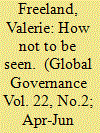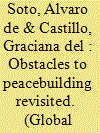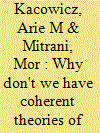| Srl | Item |
| 1 |
ID:
145067


|
|
|
|
|
| Summary/Abstract |
How do we know when a state has been socialized to an international norm? Through a case study of Sierra Leone's Truth and Reconciliation Commission, this article shows that not even voluntary compliance combined with material costs constitutes sufficient evidence of socialization. Highly vulnerable states, equally beholden to international donors and fractious domestic patronage networks, face restricted choice sets. They confront both compliance and overt noncompliance as equal existential threats, and their most important foreign policy goal becomes invisibility; that is, they must avoid attracting international attention. These states behave outwardly like they have accepted the norm's legitimacy, but their actions are rooted in a fundamentally different meaning that blocks socialization and has implications for the state system as a whole.
|
|
|
|
|
|
|
|
|
|
|
|
|
|
|
|
| 2 |
ID:
145066


|
|
|
|
|
| Summary/Abstract |
In January 1992, the economic program sponsored by the International Monetary Fund in El Salvador sacrificed the government's ability to implement the UN-mediated peace agreement on the altar of budgetary discipline and placed the country at the brink of relapsing into war. This episode turned the spotlight on a major obstacle to peacebuilding: the UN and the Bretton Woods Institutions, which frequently work elbow-to-elbow where war-torn countries struggle to move to peace, are all too often at odds and even on a collision course. This article analyzes the UN record since then; assesses whether institutional changes have improved or hindered UN capacity to support countries in overcoming such obstacles; and makes proposals for moving forward in a more effective, coherent, and coordinated way.
|
|
|
|
|
|
|
|
|
|
|
|
|
|
|
|
| 3 |
ID:
145069


|
|
|
|
|
| Summary/Abstract |
Surprisingly little is known about how government representatives pay attention to the input of nongovernmental organizations in international negotiations. This article presents an analytical framework and illustrates, with findings from the climate change negotiations 2009–2012, the conditions under which government representatives pay attention to the input from transnational advocacy networks like the Climate Action Network. Demonstrations and lobbying attempts on the international level are frequently ignored, given that negotiation mandates with little leeway are agreed on beforehand. This requires a longer-term perspective toward changing government positions for the next round of negotiations following high media attention. Governments value NGO involvement because they grant legitimacy and signal public support. Successful lobbying requires policy entrepreneurial strategies, close networks, and early input on the domestic level.
|
|
|
|
|
|
|
|
|
|
|
|
|
|
|
|
| 4 |
ID:
145070


|
|
|
|
|
| Summary/Abstract |
Undocumented international migration in Mexico is facing a serious human rights crisis. Each year, hundreds of thousands of migrants, above all from Central America, cross Mexico to reach the United States. Their journey risks extortion, kidnap, torture, disappearance, and death. For activists and civil society organizations, this crisis is explained by what they call the securitization of Mexico's migration policy. By “securitization,” they mean a policy imposed on Mexico by the United States that treats migrants as a security threat. This article challenges this interpretation, arguing that the theory of securitization is insufficient to understand the many factors that make possible the systematic violence of the human rights of migrants in transit in Mexico.
|
|
|
|
|
|
|
|
|
|
|
|
|
|
|
|
| 5 |
ID:
145068


|
|
|
|
|
| Summary/Abstract |
This article examines the trajectory of sustainable development as an evolving international norm from 1992 to 2012. It observes that sustainable development has been broadly diffused and institutionalized. Yet it is generally recognized that it has not prompted widespread change in the behavior and policy priorities of states: an outcome the article characterizes as a “failure to launch.” It explains the stalling of the norm by drawing attention to the protracted norm definition process. It analyzes an original dataset of speeches given at UN conferences on sustainable development, revealing how actors interpret the norm at three different time points. The analysis focuses on the breadth of conceptual consensus that emerges from these actors' interpretations and the depth of behavioral expectations implied by the collective discourse. It suggests that the shifting content and unstable discursive consensus regarding sustainable development has impeded the norm's ability to become a meaningful focal point for coordination and a legitimate constraint on state behavior.
|
|
|
|
|
|
|
|
|
|
|
|
|
|
|
|
| 6 |
ID:
145065


|
|
|
|
|
| Summary/Abstract |
This article offers a systematic and critical attempt to consider the question of why the discipline of international relations is at something of a loss to deal with the concept of globalization at a theoretical level. The article discusses this theoretical deficit by raising the following questions: How should we cope with globalization from an IR perspective? Why don't we have coherent theories of IR about globalization? What should we do about that? We argue that although there is a theoretical need to theorize globalization in the framework of conventional IR theories, there are serious impediments that preclude us from developing coherent IR theories about globalization, mainly due to the inherent incompatibility between the features of conventional IR theories and the concept and realities of globalization.
|
|
|
|
|
|
|
|
|
|
|
|
|
|
|
|